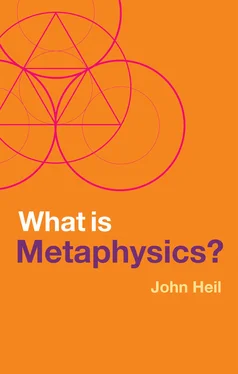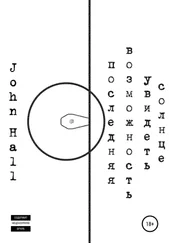The last sentence is hopelessly abstract, but you can get a feel for what I have in mind by considering three historically central categories: substance, property, relation. Substances are objects possessing various properties and standing in various relations to one another. Take this tomato, a candidate substance. The tomato is a something that has various qualities, its properties. The tomato is red, roughly spherical, and has a definite mass, and stands in a variety of relations – the tomato is next to a beetroot, and on top of your kitchen counter.
In embracing the categories of substance, property, and relation you would be betting that these would prove indispensable in any attempt to say what there is . Suppose you describe what is on the desk in front of you: a book, a pencil, and a tablet. (Your mobile phone is across the room.) To a first approximation, books, pencils, and tablets are propertied substances standing in assorted relations to one another. As you move further afield you encounter trees and rabbits, living substances. In front of you is a street sign, and a dustbin, and in the west the sun is setting. All of these things would seem to qualify as substances, all possess various properties and stand in various relations to one another, and to endless other things.
Moving beyond the everyday, you can find substances, properties, and relations in play in the sciences. Physics and chemistry speak of particles and atoms, for instance. Atoms themselves are made up of electrons, protons, and neutrons. These might be thought to be substances, possessing various properties (mass, charge, spin), and standing in assorted relations – spatial, temporal, causal.
Although we commonly take for granted that material bodies are made up of particles, we could be mistaken. What we treat as particles might turn out not to be granular, self-contained, mobile bits of matter, but to be energy concentrations in fields, or local thickenings in space. In that case, the fields or space itself would be the substances, and particles would turn out to be properties, modifications of fields or of space.
I mention these seemingly far-fetched possibilities only by way of example, only to illustrate the relation between the sciences, and particularly physics, and meta physics. At the heart of metaphysics is ontology . Ontology offers a systematic account of categories of being or reality. If an ontology of substances, properties, and relations were adequate, you could see these as serving as what C. B. Martin calls placeholders, the details being supplied by the various sciences. If material bodies are made up of particles, for instance, the particles would be the substances. If particles were replaced by fields, the substances would be the fields. The sciences have a way of surprising us, evolving unpredictably. Still, it is not easy to envision a scientific revolution that dispensed with propertied substances of some sort, however strange.
I have emphasized the relation of metaphysics to the sciences, but the sciences are not our only avenues to knowledge. Poetry, music, fiction, drama, and their cousins have much to teach us. What distinguishes the sciences and makes them particularly relevant to metaphysics, especially ontology, is their systematic nature. You can learn much by reading Middlemarch or Harry Potter , or by watching High Noon or Crouching Tiger, Hidden Dragon: Sword of Destiny on Netflix, much that you would not encounter in a textbook on psychology or biology. Thinking of literature as in competition or incompatible with the sciences would be analogous to thinking of psychology and biology as in competition with one another and with physics and chemistry.
Although I shall often turn to the sciences to illustrate metaphysical themes, nothing I have to say here requires any sort of scientific sophistication. One reason for keeping the sciences in the foreground is that this serves as a reminder that metaphysics resembles the sciences in offering accounts of what there is – not by augmenting or supplanting scientific findings, but by providing placeholders for whatever categories emerge in the course of our most rigorous efforts to get to the bottom of things.
If you have been paying attention you will know that this book is meant to be illustrative, not exhaustive. I believe that the best way to introduce metaphysical theses is to do so in the course of developing a coherent overall picture and measuring that picture against the alternatives. I can recall being frustrated as an undergraduate when those instructing us were coy about their own views on particular topics. We knew they had views, and we knew these colored what we were told, but we were left in the dark as to when the thumb was or was not on the scale.
I will be guiding you through the territory along a path with many branches leading in different ways to different destinations. I shall, however, do what I can to make it clear what advantages paths not taken might offer, thereby affording you the chance to revisit them later should you be so inclined. Finally, although I am not writing for academic philosophers, I like to think that what I have to say would be acceptable in their sight.
Many of the themes to be addressed might strike you as at odds with common sense. Common sense is a vexed notion, however. Does common sense tell us that Earth is flat, that tables and chairs exist outside our minds, or that things could have been very different than they are? Does Earth appear flat? Well, how would a spherical Earth appear? And how would things appear if nothing existed outside your mind, or if everything were preordained and nothing happened by chance?
You might have views on one or more of these points, but observe that, in the course of taking any sort of a stand on them, you would be engaging in metaphysical reflection. Is it absurd to think that nothing exists outside your own mind? Probably, but why is it absurd? Simply appealing to the appearances here is no help at all, and if you brush off such questions as idle, what are your reasons?
This should give you some idea of what is in store should you stick with me and continue reading. Meanwhile, I propose to illustrate the approach I shall be taking by starting, in chapter 2, with a topic of interest to all of us: the nature of time and its passage.
A priori, a posteriori.A subject matter is a priori if it is “prior to” experience, if it does not rely on observation and experiment. Mathematics is a priori. Disciplines that do rely on observation and experiment, empirical disciplines, are said to be a posteriori, “posterior to” experience. Metametaphysics.An endeavor aimed at characterizing the subject matter of metaphysics, its methods, principles, and its standing amongst other systematic quests for knowledge. Metaphysics.A philosophical pursuit dedicated to uncovering the most general features of what there is or might be, often in concert with the sciences. Metaphysics includes both a priori and a posteriori elements. Ontology.Metaphysics turned to the discovery and articulation of the most basic categories of being. These serve as placeholders for scientific inventories of what there is.
Competent introductions to metaphysics that go into more detail on particular topics than I have are widely available. When I have taught metaphysics to the relatively uninitiated, my preferred text has been Keith Campbell’s Metaphysics: An Introduction (New York: Dickenson, 1976), which, sadly, is long out of print. More adventurous readers might find E. J. Lowe’s A Survey of Metaphysics (Oxford: Oxford University Press, 2002) penetrating, but at times difficult.
Читать дальше












